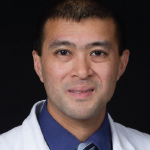Q: What does this award mean to you?
A: It’s an honor. It says my work and efforts are valued by my peers. It also makes me feel like I chose the right profession.
 Eric Gapud, MD, PhD
Eric Gapud, MD, PhD
Instructor of Medicine, the Johns Hopkins Vasculitis Center, Division of Rheumatology, Johns Hopkins University, Baltimore
Background: World-renowned research institutions, with their reams of institutional knowledge and expert faculty, can make it difficult at times to find a research focus. “Working at a place like [Johns] Hopkins, with its exceptional mentors and colleagues, is kind of like drinking out of a fire hose at times,” Dr. Gapud says. Nevertheless, he’s narrowed his research to the study of vasculitis, which presents a “great opportunity to expand understanding, both from clinical and scientific standpoints,” he says.
He says the most interesting thing about vasculitis is the subtlety. “There really is a frustration—why can’t doctors figure this out?” he says. “The opportunity is to try to figure it out early so we don’t have to watch a patient walk in the door with an aortic aneurism that’s threatening to rupture.”
Dr. Gapud has been a panelist for the Rheumatology Research Foundation Student & Resident Experience Conference, an invited speaker on the pathogenesis of vasculitis at the Vasculitis Foundation Mid-Atlantic Regional Meeting, and co-moderator of the session “Vasculitis Wannabes” at the 2017 ACR/ARHP meeting.
‘There really is a frustration—why can’t doctors figure this out?’ —Dr. Gapud
Q: You were diagnosed with ankylosing spondylitis in medical school. How has that influenced your career in medicine?
A: It helped me truly understand the feeling patients with relatively rare diseases often have: that you’re not being understood by the people close to you and your own doctors. It can be traumatic. It makes it difficult for patients to trust, reach out and communicate with caregivers and physicians. My experience made me want to become the bridge between the patient, the expert clinician and the scientist, on the cutting edge of our evolving understanding of rare disease.
Q: What’s the value of mentorship in medicine?
A: Good mentors recognize that even the most passionate, committed investigator doesn’t come ready-made, nor is he or she always going to get it right the first time. They course-correct, steer you in the right direction.
Q: What does the ACR mean to you, an early-career rheumatologist?
A: The ACR is a wonderful platform that calls attention to rare diseases. It’s unique in our field, with its resources that promote people interacting and exchanging ideas and observations, and as a wonderful advocate for patients. The ACR also is wonderful for career development, pushing young investigators like myself to share our ideas.



